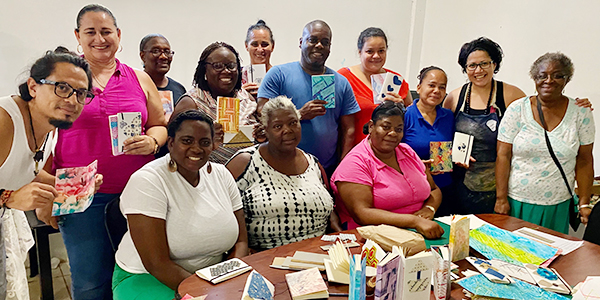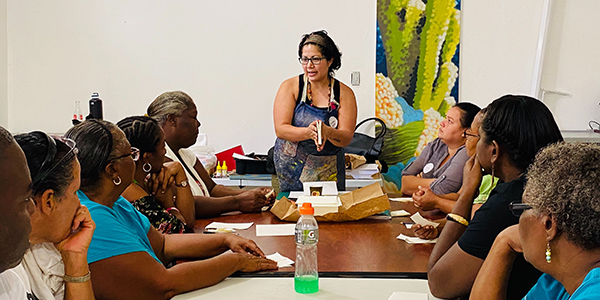Coral reefs provide an important source of food and income for coastal and island communities around the world, but more than 55 percent of reefs are threatened by overfishing globally. Coral reefs depend on fish like parrotfish and surgeonfish to consume seaweeds (also called macroalgae) and prevent them from overgrowing and smothering coral reefs.
Entrepreneurial projects, like creating handicrafts to sell to tourists or raising egg-laying chickens, offer new ways for fishers and their families to earn money. When communities have the skills and resources to generate income in new ways, the result is a win-win solution, in which people are no longer as reliant on a single resource for their livelihood, while depleted fish stocks and coral reef ecosystems get the chance to recover and thrive.
 As part of our Healthy Fisheries for Reefs initiative, CORAL collaborates with communities to develop tailored, locally appropriate ways to diversify their sources of income beyond fishing. Some examples include our egg-laying chicken project in coastal Honduras and our beekeeping project in Waivunia, Fiji, which you can read about here.
As part of our Healthy Fisheries for Reefs initiative, CORAL collaborates with communities to develop tailored, locally appropriate ways to diversify their sources of income beyond fishing. Some examples include our egg-laying chicken project in coastal Honduras and our beekeeping project in Waivunia, Fiji, which you can read about here.
In these uncertain times, ecotourism—a major source of income for many coral reef destinations—has been severely affected. With tourism revenue temporarily gone, many coral reef communities around the world are turning to overfishing to feed their families.
But in the communities where CORAL works, our work to build the resilience of local communities is paying off. Thanks to our work on income diversification, as well as governance and capacity building, these communities are stronger and better able to withstand the unknown.

One example of this is our work in the Bay Islands of Honduras, where we have been working with local communities to diversify their skillsets and sources of income. Prior to the coronavirus pandemic, CORAL and partners hosted a series of workshops to build the capacity of the Association of Artisans of Roatán, Utila and Guanaja. The artisan women that comprise the Association are already skilled in many handicrafts, such as knitting, sewing, painting and jewelry making. Through the workshops, they added to their repertoire by learning bookbinding—a skill which will allow them to create new products to appeal to tourists and visitors. In addition to diversifying the handicrafts available for sale in Roatán, this workshop also promotes best practices like creating crafts using sustainable materials that do not harm protected species or undermine their cultural heritage.
While the coronavirus pandemic has caused an unexpected halt to tourism operations, the women of the association continue to practice their craft and develop their skills under shelter-in-place. The bookbinding workshop was led by Arleth Rivera, a Honduran graduate of the National School of Fine Arts who specializes in book restoration and bookbinding. Ms. Rivera is now offering an online course via Facebook Live and Instagram, which will enable the women to continue their learning and training from the safety of their homes. We are also exploring the potential of marketing and selling the women’s products online.
Just like coral reefs, human communities who have the ability to shift and adapt in times of crisis will stand strong—and even thrive—when faced with shocks and stresses. The steps we take today to build community and reef resilience will ensure their survival in the future. We at CORAL are proud of the work we do to help our mutually dependent human and ecological systems become resilient to the complex challenges of our time.
